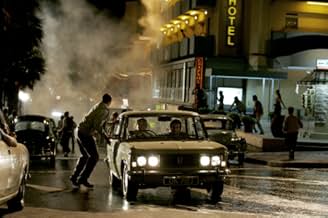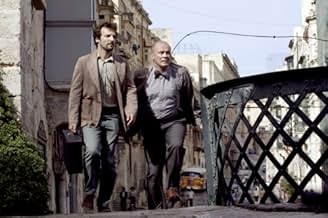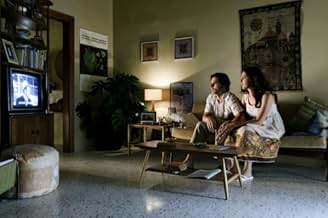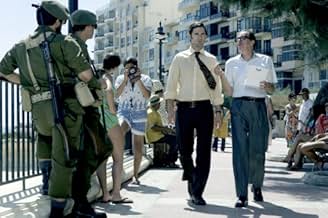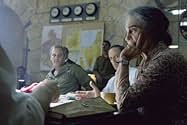Munich
Inspiré de la véritable histoire des évènements qui ont suivi la prise d'otages de Munich et des cinq hommes choisis pour assassiner les responsables de ce jour fatidique.Inspiré de la véritable histoire des évènements qui ont suivi la prise d'otages de Munich et des cinq hommes choisis pour assassiner les responsables de ce jour fatidique.Inspiré de la véritable histoire des évènements qui ont suivi la prise d'otages de Munich et des cinq hommes choisis pour assassiner les responsables de ce jour fatidique.
- Nommé pour 5 Oscars
- 14 victoires et 75 nominations au total
Marie-Josée Croze
- Jeanette the Dutch Assassin
- (as Marie-Josee Croze)
Valeria Bruni Tedeschi
- Sylvie
- (as Valéria Bruni Tedeschi)
Amos Lavi
- General Yariv
- (as Amos Lavie)
Histoire
Le saviez-vous
- AnecdotesGuri Weinberg played his own father. He is the son of Moshe Weinberg, the Israeli wrestling referee and former champion, who died in the massacre when Guri was just one month old.
- GaffesThough they took the time to digitally add the World Trade Center to the final shot, they didn't edit out the Citigroup Center, Trump World Tower, and the Bloomberg building, which were built after the time of the movie.
- Versions alternativesThe film was heavily censored in Malaysia for a 'U' rating. The uncut version is rated '18PL'.
- ConnexionsFeatured in Siskel & Ebert & the Movies: The Best Films of 2005 (2005)
- Bandes originalesAin't No Sunshine
Written & Performed by Bill Withers
Courtesy of Columbia Reecords
By Arrangement with Sony BMG Music Entertainment
Commentaire à la une
I am not a big Spielberg fan, and find he often goes for cheap emotional manipulation in his films, especially his endings. I was there fore amazed at the unflinching control he exercised in Munich, his utter unwillingness to flinch at complexities, his ability to dissect the ideological and moral sureties of all sides within the natural rhythms of the thriller genre. There is so much to praise in this film, because it is utterly seamless film-making with a keen eye for every little detail that never reveals the intense precision behind its construction.
While some have found the film "disengaged," I found that it pulled at the viewer's conscience through the central characters, not only Bana's Israeli agent Avner and his cohorts, most of who slowly find themselves gnawed by doubts of their mission's morality and effectiveness, but also smaller characters as well, drawn with indelible deftnessthe weary ex-French Resistance fighter now a trader in deadly information to stateless agents because of his cynicism about recurrent corrupt regimes replacing each other, or the PLO operative who debates Palestinian strategy and justification with Avner, who he wrongly believes to be a German left-wing terrorist who is "soft" on Jews because of the Holocaust. The economy of Spielberg's film-making is breathtaking in hindsight, so that what at first seems a relatively flat and emotionless exercise in historical recreation slowly seeps into one's subconscious and then moves upward, in quick bursts of sudden bursts of emotional and intellectual recognition by the viewer. These are real human beings, these are fighters in a war they believe in desperately and whose people have suffered terribly yet can find no real peace.
For this Kushner and Roth's screenplay must get much credit, the crisp narrative development intertwined with intellectually rigorous set pieces and flat-out armrest-clutching actions sequences. John Williams, who has managed to be understated in the past, is equally adept at building (or feinting) tension and subtly commenting on character development. Check out the slightly dissonant piano in the last scene to see what I mean. Longtime Spielberg collaborator Janusz Kaminski creates some amazing framing devices, especially as the action sequences are about to unfold and during moments of intimate conversations imbued with tension. Michael Kahn's editing is crisp and occasionally startling, as in the way the conclusion of the horrifically bungled Munich "rescue" is related. The retelling of the entire event from break-in to conclusion is doled out in bits and pieces in what seems at first an attempt to soften its impact but in the end, entwined as it is with all of the complicated issues, is finally revealed as a masterful means of achieving the fully deserved emotional impact within a complexly rendered ideological, moral and strategic matrix. There is not a false note in any of the acting, and the casting is uniformly spot-on.
About the politics. The radicals on either side will reject the film out of hand because it dares to render both sides as human and worthy of understanding. But attempting to understand choices of violence and vengeance as strategies does not in any way mean condoning them. Certainly, anyone who feels that the film somehow allows a viewer to walk away thinking that Black September was justified in its attack is probably projecting his or her fears about how some imagined uninformed viewer might react. Instead, the film demonstrates that whether one feels either or both sides justified it doesn't mannerneither side can win through violence at this point. This was Yitzhak Rabin's great insightyou don't make peace with your friends, you make peace with your enemies. His Israeli Jewish murderers wanted violence to continue, believing that only a continued state of war would keep Israel from giving back land they saw as bound up with their faith but which international law, historical study and the basic "facts on the ground" reveal to be bound to be returned to the Palestinians. Ariel Sharon, of all people, came to understand this, though without the larger vision and magnanimity of spirit that his fellow warrior Rabin discovered. Spielberg's message is clearthe extremists will choose war over peace, but must so many of us side with the extremists because of our fear of appearing weak or "giving in"? A last note on politicsthere is clear relevance to the United States' current predicament post-9/11. One can almost here Cheney or Bush making the speech made by Israeli premier Golda Meir in the film (an extraordinary piece of recreation that transcends mere imitation), only probably with more moral surety and less sense of resignation. Anyone paying attention to world reaction to Guantanimo, Abu Gharib, the bombing of Afghan and Iraqi villages and the spiriting away of suspected terrorists through "rendition" for torture in "friendly" nations must be aware that whether one leans hard or soft on such matters, there is going to be a price to be paid. The hardliners believe we will just keep punching and slugging and eventually the bad guys will go down; that they will not reproduce themselves like the many-headed Hydra or germinate and reproduce by the thousands in the fetid waters of our perceived hypocrisywhether you think it justified or not it doesn't matter. As Spielberg makes clear in this film, all that matters in the end is peace or violence, and whoever ultimately desires the former had better be damn sure that their use of the latter is measured by the awareness that it use will create debts that will need to be repaid in the end, and the debtors will most likely be the generations to come on all sides.
While some have found the film "disengaged," I found that it pulled at the viewer's conscience through the central characters, not only Bana's Israeli agent Avner and his cohorts, most of who slowly find themselves gnawed by doubts of their mission's morality and effectiveness, but also smaller characters as well, drawn with indelible deftnessthe weary ex-French Resistance fighter now a trader in deadly information to stateless agents because of his cynicism about recurrent corrupt regimes replacing each other, or the PLO operative who debates Palestinian strategy and justification with Avner, who he wrongly believes to be a German left-wing terrorist who is "soft" on Jews because of the Holocaust. The economy of Spielberg's film-making is breathtaking in hindsight, so that what at first seems a relatively flat and emotionless exercise in historical recreation slowly seeps into one's subconscious and then moves upward, in quick bursts of sudden bursts of emotional and intellectual recognition by the viewer. These are real human beings, these are fighters in a war they believe in desperately and whose people have suffered terribly yet can find no real peace.
For this Kushner and Roth's screenplay must get much credit, the crisp narrative development intertwined with intellectually rigorous set pieces and flat-out armrest-clutching actions sequences. John Williams, who has managed to be understated in the past, is equally adept at building (or feinting) tension and subtly commenting on character development. Check out the slightly dissonant piano in the last scene to see what I mean. Longtime Spielberg collaborator Janusz Kaminski creates some amazing framing devices, especially as the action sequences are about to unfold and during moments of intimate conversations imbued with tension. Michael Kahn's editing is crisp and occasionally startling, as in the way the conclusion of the horrifically bungled Munich "rescue" is related. The retelling of the entire event from break-in to conclusion is doled out in bits and pieces in what seems at first an attempt to soften its impact but in the end, entwined as it is with all of the complicated issues, is finally revealed as a masterful means of achieving the fully deserved emotional impact within a complexly rendered ideological, moral and strategic matrix. There is not a false note in any of the acting, and the casting is uniformly spot-on.
About the politics. The radicals on either side will reject the film out of hand because it dares to render both sides as human and worthy of understanding. But attempting to understand choices of violence and vengeance as strategies does not in any way mean condoning them. Certainly, anyone who feels that the film somehow allows a viewer to walk away thinking that Black September was justified in its attack is probably projecting his or her fears about how some imagined uninformed viewer might react. Instead, the film demonstrates that whether one feels either or both sides justified it doesn't mannerneither side can win through violence at this point. This was Yitzhak Rabin's great insightyou don't make peace with your friends, you make peace with your enemies. His Israeli Jewish murderers wanted violence to continue, believing that only a continued state of war would keep Israel from giving back land they saw as bound up with their faith but which international law, historical study and the basic "facts on the ground" reveal to be bound to be returned to the Palestinians. Ariel Sharon, of all people, came to understand this, though without the larger vision and magnanimity of spirit that his fellow warrior Rabin discovered. Spielberg's message is clearthe extremists will choose war over peace, but must so many of us side with the extremists because of our fear of appearing weak or "giving in"? A last note on politicsthere is clear relevance to the United States' current predicament post-9/11. One can almost here Cheney or Bush making the speech made by Israeli premier Golda Meir in the film (an extraordinary piece of recreation that transcends mere imitation), only probably with more moral surety and less sense of resignation. Anyone paying attention to world reaction to Guantanimo, Abu Gharib, the bombing of Afghan and Iraqi villages and the spiriting away of suspected terrorists through "rendition" for torture in "friendly" nations must be aware that whether one leans hard or soft on such matters, there is going to be a price to be paid. The hardliners believe we will just keep punching and slugging and eventually the bad guys will go down; that they will not reproduce themselves like the many-headed Hydra or germinate and reproduce by the thousands in the fetid waters of our perceived hypocrisywhether you think it justified or not it doesn't matter. As Spielberg makes clear in this film, all that matters in the end is peace or violence, and whoever ultimately desires the former had better be damn sure that their use of the latter is measured by the awareness that it use will create debts that will need to be repaid in the end, and the debtors will most likely be the generations to come on all sides.
Meilleurs choix
Connectez-vous pour évaluer et suivre la liste de favoris afin de recevoir des recommandations personnalisées
Détails
- Date de sortie
- Pays d’origine
- Langues
- Aussi connu sous le nom de
- Untitled 1972 Munich Olympics Project
- Lieux de tournage
- Bugibba, Malte(Olympic Hotel in Cyprus)
- Sociétés de production
- Voir plus de crédits d'entreprise sur IMDbPro
Box-office
- Budget
- 70 000 000 $US (estimé)
- Montant brut aux États-Unis et au Canada
- 47 403 685 $US
- Week-end de sortie aux États-Unis et au Canada
- 4 152 260 $US
- 25 déc. 2005
- Montant brut mondial
- 130 982 407 $US
- Durée2 heures 44 minutes
- Couleur
- Mixage
- Rapport de forme
- 2.35 : 1
Contribuer à cette page
Suggérer une modification ou ajouter du contenu manquant


